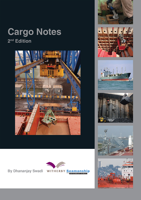Published: July 2018
Author: Oil Companies International Marine Forum (OCIMF)
This new publication offers guidelines for safe cargo handling and associated operations on board F(P)SOs. It supplements existing guidance in the International Safety Guide for Oil Tankers and Terminals (ISGOTT), by addressing activities and procedures that are either outside the scope of ISGOTT or are conducted differently on F(P)SOs, which often have multiple operations taking place at the same time. This publication will be essential for F(P)SO operators, as well as anyone involved in their design and management.
<p">Purpose and scope <p">Glossary <p">Abbreviations <p">Bibliography <p">Section one <p">Safety management <p">Safety management system <p">Safe work systems <p">Personal Protective Equipment <p"> <p">Section two <p">Hazardous materials associated with F(P)SO operations <p">Hydrogen sulphide <p">Naturally Occurring Radioactive Materials <p">Mercury <p">Volatile Organic Compounds and BTEX <p">Methanol <p">Biocides <p">Bio-monitoring of personnel for toxic exposure <p"> <p">Section three <p">General hazards associated with F(P)SO operations <p">General principles <p">Control of potential ignition sources <p">Communications equipment <p">Use of tools <p">Lifting equipment <p"> <p">Section four <p">Storage tank atmosphere control and venting arrangements <p">Storage tank atmosphere control <p">Inert gas system <p">Hydrocarbon blanketing <p">Vapour recovery <p">Venting arrangements <p">Gas monitoring <p">Pyrophoric iron sulphide <p"> <p">Section five <p">F(P)SO cargo operations <p">General <p">Simultaneous Operations <p">Management of interfaces <p">Operability and maintainability <p">Safe design, stress and stability considerations <p">Cargo pumping arrangements <p">Cargo Guidelines for F(P)SOs <p">Pressure surge management <p">Tank coatings <p">Use of crude oil as fuel <p"> <p">Section six <p">Water management <p">General <p">Produced water <p">Tanks used for handling water <p">Chemical treatment <p">Drain systems <p"> <p">Section seven <p">Crude Oil Washing <p">General <p">Crude Oil Washing system maintenance <p"> <p">Section eight <p">Tank cleaning and gas freeing for entry <p">General <p">Water washing (open and closed loop) <p">Gas freeing <p"> <p">Section nine <p">Control of work in storage and ballast tanks <p">Preparation of tanks for entry <p">Tank entry procedures <p">Preparation of work site for hot work <p">Control of cold work and in-tank maintenance <p">Tank inspections <p">De-mucking of tanks <p"> <p">Appendix <p">Example of a SIMOPS decision making matrix





































